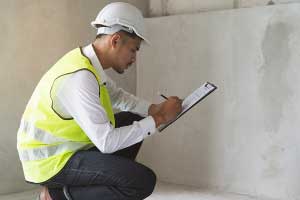Disclaimer: The information on our website is provided for general information purposes only. We make no representations or warranties of any kind, express or implied, about the completeness, accuracy, reliability, suitability or availability with respect to the website or the information contained on our website for any purpose. Any reliance on such information is therefore strictly at your own risk and we are not liable for any damages or losses arising out of or resulting from your reliance on any information contained on our website.
A building inspector will thoroughly inspect the quality of a structure to report whether it meets building code and regulations. These inspectors may need to access hard to reach places so it can be somewhat physical at times. Attention to detail is also vital for this position. Other titles building inspectors go by include building code administrator, building official, or construction inspector. Watch a video to learn about what a building inspector does:
Benefits of a Building Inspector

Building inspectors value the independence that comes with their role, often working autonomously and setting their schedules. Government employment is also an option for those in this field. Self-motivation and job satisfaction are high among building inspectors, who take pride in preventing property issues and holding builders accountable. Interactions with various people, including clients and tradespeople, are a plus.
The job remains dynamic, with new projects and a mix of indoor report writing and outdoor site inspections. Becoming a building inspector is accessible without a bachelor’s degree, though additional coursework can be beneficial. The income potential is substantial and can grow with a strong reputation. Government-employed inspectors typically receive standard benefits like health coverage, sick leave, vacation days, and retirement plans.
How to Become a Building Inspector
An employer will most likely want to see that you graduated high school (or the equivalent) and had some experience working in the construction field. After gaining employment, you are then most likely to learn on-the-job. Though some building inspectors hold a bachelor’s degree, many that do not at least some college or had earned a certification. Therefore, you may want some formal education to gain a competitive edge over other applicants. You may look at construction-related programs offered at your local community college or technical school.
Job Description of a Building Inspector
A building inspector’s job description may vary slightly whether you are inspecting buildings or structures. Some building inspectors inspect construction such as bridges or dams. Whether inspecting a home, office building, or dam though, all building inspectors are evaluating the quality and integrity of the structure. There are a lot of items to check during the inspection that goes beyond the structure as well. These professionals also know how to check the quality of the plumbing, electrical work, and heating and cooling systems. These inspectors will create a report based on their findings and share that report with their customers. They may also educate their customer on their findings during the inspection and take photos of any problematic areas for documentation purposes.
Building Inspector Career Video Transcript
We all depend on the built environment – buildings, homes, and even sidewalks and streets — to be safe and stable. Construction and building inspectors ensure that these, and many other structures, meet building codes, zoning regulations, and requirements spelled out in building contracts. There are many types of inspectors. From general building and home inspectors to construction and mechanical inspectors who examine everything from electrical systems, elevators, and HVAC systems to bridges, sewer systems, and even paint coatings.
Typically, inspectors perform an initial check during the first phase of construction, and follow-up inspections throughout a construction project. At project completion, they make a final inspection and write up their findings in a report. These workers spend most of their time inspecting worksites, but also work in field offices to review blueprints and schedule inspections. They may have to climb ladders or crawl in tight spaces to complete their inspections.
Most inspectors work for local government… many also work in architecture or engineering firms. Although full-time, regular business hours are typical, additional hours may be needed during heavy construction seasons, or to respond to job site accidents. Inspectors typically learn on the job but most employers require a high school education and extensive knowledge of construction trades. Many states require a license or certification.
Article Citations
- Bureau of Labor Statistics, U.S. Department of Labor, Occupational Outlook Handbook, Building Inspectors.
- National Center for O*NET Development. 47-4011.00. O*NET OnLine.
- The video is Public Domain from the U. S. Department of Labor, Employment and Training Administration.
